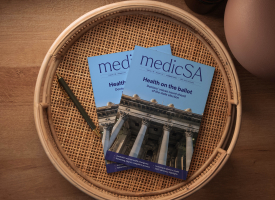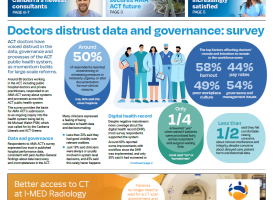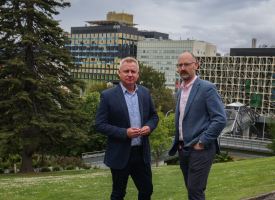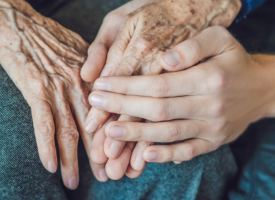AMA President calls for Premiers to listen to CHOs as third COVID wave arrives
Transcript of AMA President Dr Omar Khorshid on Weekend Sunrise 10 July 2022
Dr Khorshid says if the chief health officers are saying we really need to be thinking about indoor mask mandates, or any other public health measure his plea to the premiers is "please just do it".
MONIQUE WRIGHT: Australia's COVID hospital admissions have reached their highest levels since early February. Yesterday, there were 4000 hospital admissions, New South Wales ahead by a huge margin. Queensland coming in second. There were 76 deaths, including 33 in New South Wales, 20 in Victoria.
MATT DORAN: With the nation recording an average of 33,000 cases per day, patients are very quickly filling hospital wards. But if this is just the beginning of a new COVID surge, then how much more can we take? The National President of the Australian Medical Association is Dr Omar Khorshid. Doctor, morning to you. Thank you for being with us. Look, you were on the show a couple of months ago with the very latest hospital report card. It wasn't good then. How is it now?
OMAR KHORSHID: Well, Matt, it's going to be no surprise to any Australian to hear that with 4000 Australians in hospital with COVID, with the fact that the hospitals were too small to begin with, the fact that we've got a workforce shortage, plus COVID and the flu ravaging our communities at the moment, the hospitals are really, really struggling.
You don't want to get sick just at the moment in pretty much any of our states and territories due to the pressure on hospitals, the inability for you to actually access those hospitals when you need them. But I guess the other message, though, is that once you do get in that door, if you've got severe COVID or something else, you will get the care, the best care that those health professionals can give you.
MONIQUE WRIGHT: Look, I think that's a really good message, Omar. I was in hospital in the last month with my ten-year-old daughter who had complications from COVID, which I know is rare for children, but she did. I've never seen the hospitals like it, and I've spent a fair bit of time in them.
It was absolute carnage. It was like a war zone. And the people that are working there, we hear it all the time, but just a superhuman effort. Like, I get emotional just thinking about the strain that they are under and how frustrated they must be that people are not getting their booster jabs and they're not wearing masks in confined spaces. What needs to happen to put hospitals in the best possible position to handle the expected increase?
OMAR KHORSHID: Well, it'd be great if we could fix those hospitals to give them the money, the size, the people that they need. But none of those are going to help us through the next couple of months because there just isn't time. So, what can we all do as individuals? And I think you hit the nail on the head just there, Monique. We can go and get our third and fourth COVID doses. There's a huge number of Australians who haven't done that, and there's very good evidence that that third dose has a huge impact in giving you long term immunity to protect you from severe disease or hospitalisation, to protect you from being one of those people sitting in that waiting room or sitting in a hospital bed blocking it from someone else.
Masks do need to be part of the conversation and I think some really clear messaging from our politicians, our state premiers. We can already see that the experts, the chief health officers, and epidemiologists, they're starting to get worried. They're now turning up their language. They're talking about masks. They're talking about potentially facing mandates again because they're worried.
And I think there's an opportunity for us to respond to that as a community and to do the right thing by everyone else with those- the flu vaccine, the COVID vaccine, wearing masks in high-risk scenarios. And, of course, for older Australians who may need antivirals if they get COVID, to have that plan ready, to have worked out with their GP already. Do I need to get antivirals? How am I going to get them? How am I going to, once I get my positive test, actually get access to those? Because again, they can mean the difference between a pretty mild COVID illness and ending up in hospital.
MATT DORAN: Doctor, when you say there's an opportunity for the conversation about masks now, have we moved beyond that- do we need someone to lead the conversation? Because it feels like there is an absence there of someone standing up and saying, right, we know as a community we could wear them, but do we need someone to actually step forward and say that we should, given what you are saying about what we're seeing in hospitals and what we're hearing from the epidemiologists about what is going to happen over the next four weeks?
OMAR KHORSHID: I think everyone is looking for that leader. Some even look to me as the President of the AMA. But of course, as a member organisation, I've also got a number of doctors who are as sick of the pandemic as many in the community are. But when we think about what's important to us, what do we value in life? Health pretty much comes at the top of that list. And the biggest threat to our health this coming winter and over the next few weeks is the ongoing pandemic.
It is either catching COVID or even if you get something else, even if you have a car accident, you get appendicitis. The fact that we have this pandemic going on is going to stop you accessing the care that you need. So, if masks can actually make a difference, then that is what we've got to do. And my call to the politicians today is if that's the message you're getting from the experts, if the chief health officers are saying, look, we really need to be thinking about indoor mask mandates or any other public health measure that those Chief Health Officers are suggesting, my plea to the premiers is please just do it. Take the community with you, show some leadership, because that is what we need right now in order to protect the vulnerable in our community.
MONIQUE WRIGHT: Absolutely everything that you said to us before the election on the report card on the hospitals has come to life exactly as you predicted it. Hopefully now these predictions that you're making, and the recommendations will be heard. Thank you so much, Dr Omar Khorshid.
OMAR KHORSHID: Cheers.



